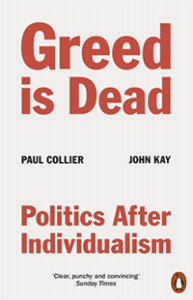 In Greed is Dead, Paul Collier and John Kay (C&K) argue that the world has become more selfish. They point to many examples, from celebrities piggybacking on social causes for self-promotion to chief executive officers putting profits over all else. They also argue that the effects of this selfishness are worrisome and unsustainable. With political polarisation holding up important policy measures and inequality on the rise, people who are only out for themselves have hurt, and will likely continue to hurt, the functioning of the developed world. The solution, according to C&K, is to embrace communitarian ideals which prioritise social bonds and civic engagement.
In Greed is Dead, Paul Collier and John Kay (C&K) argue that the world has become more selfish. They point to many examples, from celebrities piggybacking on social causes for self-promotion to chief executive officers putting profits over all else. They also argue that the effects of this selfishness are worrisome and unsustainable. With political polarisation holding up important policy measures and inequality on the rise, people who are only out for themselves have hurt, and will likely continue to hurt, the functioning of the developed world. The solution, according to C&K, is to embrace communitarian ideals which prioritise social bonds and civic engagement.
But a more communitarian world is at direct odds with other ideas which have been much more influential among policymakers in the last few decades, according to the authors. These ideas are the framework of individual rights born out of the French and American revolutions and modern economic methodology which promotes the doctrine of market fundamentalism where all problems can be solved by a free market. The negative consequences of the former can be seen in the framing of all social issues by activists in terms of “rights” which, even when well-intentioned, goes against communitarian ideals, in the view of the authors. Those of the latter can be seen in the large gap in income between the haves and the have-nots.
Because the authors are economists, the book tends to focus on this second body of thought. In particular, they take aim at the assumptions in neoclassical economic theory that individuals are perfectly rational, consistent, and self-interested. This characterisation of a person is sometimes called Homo Economicus and tends to be built into the theoretical models economists use to understand the world. But C&K argue this characterisation promotes the idea that humans are greedy, robotic, and amoral sociopaths. Furthermore, as economists have risen through the ranks in government, business, and elsewhere, so has this pernicious framework as a way to approach social problems.
In the sense that the book is a critique of modern economics, it is similar to many others released in the last couple decades that either scrutinise neoclassical methodology or the role of economists in public policy. In Thinking Fast and Slow by Daniel Kahneman and Nudge by Richard Thaler and Cass Sunstein, for example, the authors challenge the assumption that a perfectly rational Homo Economicus accurately captures human behaviour. In The Economists’ Hour by Binyamin Appelbaum and Economism by James Kwak, the authors critique the role of economists in the halls of power and their supposed impact on economic inequality.
Greed is Dead is unique, however, in linking Homo Economicus to an increase in selfishness more broadly. Whereas these other works tend to zero-in on the specifics of methodology or a particular policy, C&K’s work is more philosophical and far-reaching in nature. Though they might be right that we’ve all become more selfish, more insight into what they actually mean by the word would have been beneficial. More materialistic? More egoistic? More addicted to our phones? Distinguishing the definition from that of individualism would have made it more obvious how the arcane assumptions baked into economic models have actually led to such devastating consequences throughout society. Sure, it is the case that certain economists hold positions of power, but it is important to remember that Homo Economicus mostly lives in the obscure pages of academic journals.
Another reason this would have been helpful is because C&K seem to equate self-interest with selfishness. Though these terms may be used interchangeably in common conversation, they’re different in an important way. Whereas both capture concern with one’s own well-being, selfishness includes the complete disregard for others which does not always describe Homo Economicus. In fact, many models integrate altruistic parents investing in their children’s educations, religiosity, or voting dynamics. More complex models even integrate cooperation between individuals, illustrating the flexibility of the neoclassical approach.
The same can be said of the supposed link between Homo Economicus and market fundamentalism. The conclusions of many neoclassical models make a strong case for either more public education, education subsidies, taxes on automation, pensions, childcare subsidies, or a universal basic income. These are hardly policies associated with market fundamentalism and are instead a testament to the versatility of the neoclassical approach. Importantly, these results emerge from models where Homo Economicus is just as self-interested as he or she ever was.
All this is not to say the neoclassical approach to economics is perfect. There are many models built on faulty assumptions that, in turn, can lead to faulty conclusions. Furthermore, the allure of mathematical rigor has often crowded out other valid economic approaches to issues. Nevertheless, this type of approach is better thought of as just another tool in the economists’ toolkit to be deployed as necessary, like a linear regression or a case study, rather than an ideology.
Overall, Greed is Dead is a unique book in that it combines philosophy with economics and social commentary. C&K accurately identify many of the developed world’s most acute problems from political polarisation to inequality. They also introduce the reader to the ideas of many interesting communitarian thinkers which have only become more relevant. But when it comes to how we got here, their argument becomes much less convincing. Instead of seeing Homo Economicus as the antithesis of a world that values community, C&K should instead see it as part of the solution.



Leave a Comment